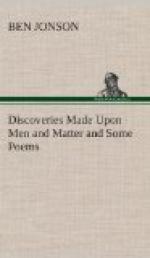Do but look on her eyes, they do
light
All that Love’s world compriseth!
Do but look on her hair, it is bright
As Love’s star when it riseth!
Do but mark, her forehead’s smoother
Than words that soothe her!
And from her arched brows, such a grace
Sheds itself through the face,
As alone there triumphs to the life
All the gain, all the good, of the elements’
strife.
Have you seen but a bright lily
grow
Before rude hands have touched it?
Have you marked but the fall o’ the snow
Before the soil hath smutched it?
Have you felt the wool of beaver?
Or swan’s down ever?
Or have smelt o’ the bud o’ the brier?
Or the nard in the fire?
Or have tasted the bag of the bee?
O so white! O so soft! O so sweet is she!
IN THE PERSON OF WOMANKIND A SONG APOLOGETIC
Men, if you love us, play no more
The fools or tyrants with your friends,
To make us still sing o’er and o’er
Our own false praises, for your
ends:
We have both wits
and fancies too,
And, if we must,
let’s sing of you.
Nor do we doubt but that we can,
If we would search with care and
pain,
Find some one good in some one man;
So going thorough all your strain,
We shall, at last,
of parcels make
One good enough
for a song’s sake.
And as a cunning painter takes,
In any curious piece you see,
More pleasure while the thing he makes,
Than when ’tis made—why
so will we.
And having pleased
our art, we’ll try
To make a new,
and hang that by.
Ode
To the Immortal Memory and Friendship of that Noble
Pair, Sir Lucius
Cary and Sir Henry Morison.
I.
The turn.
Brave infant of Saguntum, clear
Thy coming forth in that great year,
When the prodigious Hannibal did crown
His cage, with razing your immortal town.
Thou, looking
then about,
Ere thou wert
half got out,
Wise child, didst hastily return,
And mad’st thy mother’s
womb thine urn.
How summed a circle didst thou leave mankind
Of deepest lore, could we the centre find!
The counter-turn.
Did wiser nature draw thee back,
From out the horror of that sack,
Where shame, faith, honour, and regard of right,
Lay trampled on? the deeds of death and night,
Urged, hurried
forth, and hurled
Upon th’
affrighted world;
Sword, fire, and famine, with fell
fury met,
And all on utmost ruin set;
As, could they but life’s miseries foresee,
No doubt all infants would return like thee.
The stand.




